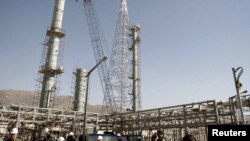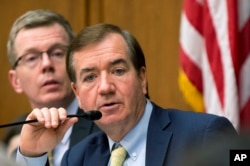The United States is purchasing 32 tons of a key component in the development of atomic weapons from Iran, in a bid to help Tehran implement provisions in the landmark nuclear deal.
The U.S. Energy and State departments confirmed Friday the purchase of heavy water, which can be used to produce weapons-grade plutonium.
The plan was announced as U.S., Iranian and other officials met in Vienna to discuss implementation of the nuclear agreement, known as the Joint Comprehensive Plan of Action, or JCPOA.
Earlier, Iran sold low-enriched uranium to Russia to help implement the deal.
Word of the U.S. purchase came ahead of a Friday meeting between Secretary of State John Kerry and Iranian Foreign Minister Mohammad Javad Zarif on the sidelines of the U.N. climate change signing ceremony in New York.
Iran has complained that it has not been getting the sanctions relief it deserves under the nuclear deal because of restrictions imposed by financial institutions.
Heading into the talks, Kerry said the U.S. has not and will not stand in the way of business permitted in Iran since the nuclear agreement was implemented in January.
“Unfortunately, there seems to be some confusion among some foreign banks, and we want to try to clarify that as much as we can,” he said.
'Difficult path'
Zarif said Iran continued to have differences with the U.S.
“We hope that the statement made today by Secretary Kerry will begin to open the difficult path that has been closed because of concern that banks had about the U.S. approach towards implementation,” he said.
Earlier Friday, the heavy water purchase drew immediate criticism from some U.S. lawmakers, including House Foreign Affairs Committee Chairman Ed Royce, who has expressed ongoing concerns about the possible ramifications of the nuclear deal.
"Once again, the Obama administration is handing Iran's radical regime more cash," Royce said.
"Far from curbing its nuclear program, this encourages Iran to produce more heavy water to sell, with a stamp of U.S. approval," he added.
The State Department said the U.S. would not lose sight of its concerns about Iran’s provocative actions, such as its recent ballistic missile tests.
“No one is blind to Iran’s unhelpful activities in the region,” said Elizabeth Trudeau, the department's press relations director.
“This [heavy water purchase] was a commercial transaction. It was allowable. It fills a need here in the United States,” she added in a Friday briefing.
U.S. officials say the purchase will cost about $8.6 million. They described the transaction as "limited in scope" and said it would be routed through "third-country financial institutions." A senior State Department official said the U.S. has not ruled out future purchases.
Transportation, resale
The Energy Department said it expected to resell the heavy water to U.S. research and commercial buyers, but indicated the U.S. had not committed to future sales.
"The United States will not be Iran's customer forever," the Energy Department said in a statement. "It is exclusively Iran's responsibility to find a way to meet its JCPOA commitments."
The State Department said Iran was expected to deliver the heavy water to the U.S. "in the coming weeks."
State Department spokesman John Kirby said the material was not radioactive and did not present safety concerns.





